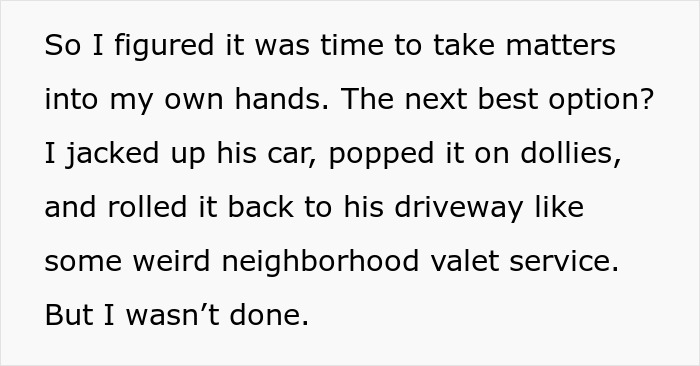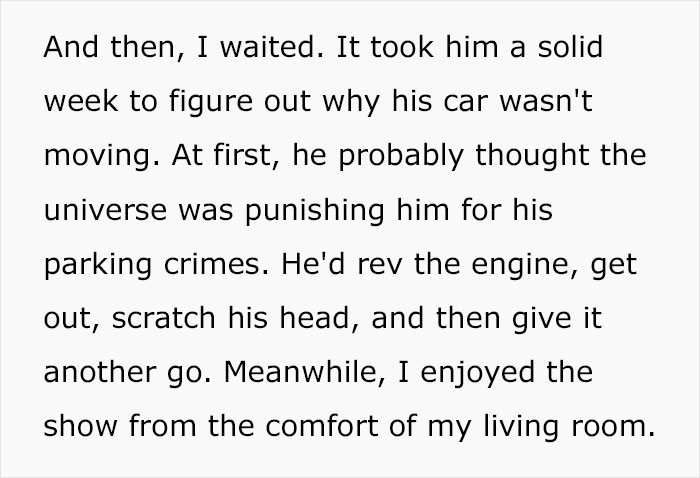We’ve all had our fair share of run-ins with bad drivers, but probably nothing quite like the guy in this Reddit story.
His neighbor, who was no stranger to a few too many drinks, had a habit of parking his car in the most inconvenient places. One day, he abandoned it right in the storyteller’s driveway.
Frustrated but determined, the man decided it was time to teach his neighbor a lesson—with a touch of petty revenge and some clever engineering. Keep reading to see how this genius payback played out!
After a few too many drinks, the man’s neighbor often left his car in the worst places

Image credits: Anna Guerrero / pexels (not the actual photo)
One unlucky day, he abandoned it in the man’s driveway, so payback was in order




Image credits: cottonbro studio / pexels (not the actual photo)



Image credits: Andrea Piacquadio / pexels (not the actual photo)


Image credits: adb1228
Why revenge feels so good
Most of us have been wronged by someone at some point in our lives. Whether we choose to get back at them, like the man in the Reddit story, is another matter. Yet, the thought alone can feel so satisfying.
Our desire for revenge has deep evolutionary roots. For our ancestors, getting even was a way to maintain order. When acts of aggression like theft or violence were met with retaliation, it discouraged the original offender from repeating their actions. On a primal level, it’s simple: hurt the person who hurt you to protect yourself.
Unlike random random acts of aggression, revenge is a calculated response to feeling mistreated. By taking back control and finding a sense of validation, getting even can feel deeply rewarding.
Researchers have two theories for why revenge feels so pleasurable. First, it’s satisfying to see the person who hurt you suffer. Second, it’s important that they understand why they’re being targeted. Ideally, this realization will lead them to make amends. However, that’s not always the case, and revenge can sometimes spiral into a cycle of back-and-forth conflict, making things much worse than they were.
“When [revenge] goes right, it triggers remorse and guilt, and a need for the other person to fix things,” says Stephen Yoshimura, a professor of communication studies at the University of Montana. “But a lot of times, because things don’t get explained or there’s a lot of misunderstanding about what exactly is the situation… they just respond with counter-retaliation. That’s where things start to get out of hand.”
From a biological perspective, the brain enjoys revenge because it stimulates its reward system. But this satisfaction doesn’t last long. “In general, that’s how reward works,” says David Chester, an associate professor of psychology at Virginia Commonwealth University. “You get it for a little while, and it fades very quickly.”
For some, the initial relief is clouded by feelings of guilt or embarrassment that follow. Others with more vengeful tendencies may find themselves wanting more, potentially leading to harmful patterns. “There does seem to be this emotional cycle of revenge: Momentary reward, quick decay, and then this little bit of the hangover that may then motivate people to go back into the cycle, and maybe reinforce it,” Chester says. “Next thing you know, you’re someone who’s doing vengeful things quite often.
While getting back at someone can be tempting, experts recommend finding healthier methods to process those emotions. Chester suggests expressing how someone’s actions impacted you in a constructive way. This could be as straightforward as explaining how their words or behavior made you feel.
If you’re dealing with abuse or a crime and aren’t in a position to have a safe conversation, don’t take matters into your own hands. Instead, reach out to a therapist, law enforcement, or a mediator for support.
If you still feel compelled to get even, channel that energy into something positive: go for a walk, take up a new hobby, or spend time with friends. Anything that shows you’re doing things that make you happy, rather than letting them see you upset. “By virtue of focusing on making your life good, you’ve thwarted their attempts at hurting you,” Chester says.

Image credits: Ketut Subiyanto / pexels (not the actual photo)
In the replies, the man dropped more details about the bizarre stunts his drunk neighbor would pull




Commenters cheered on the man’s clever act of petty revenge



















